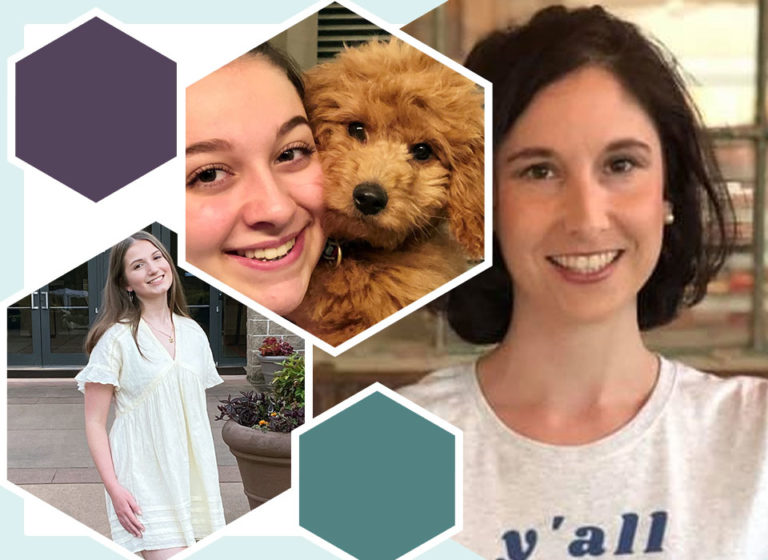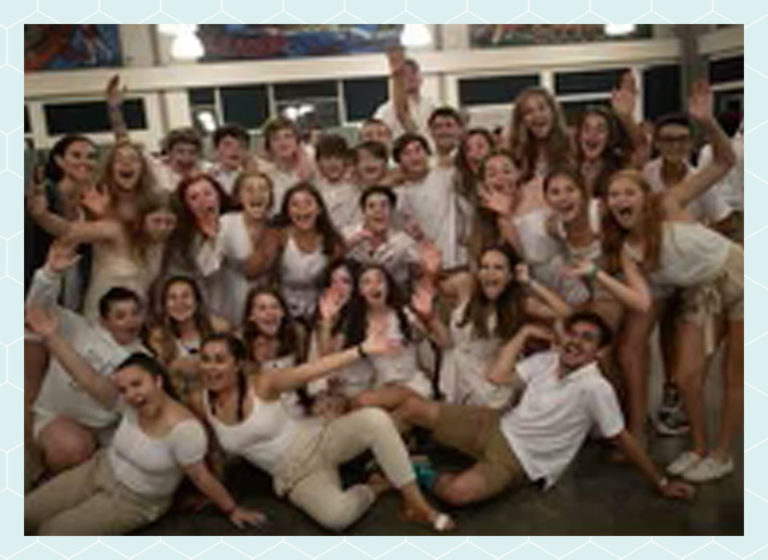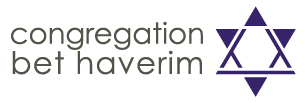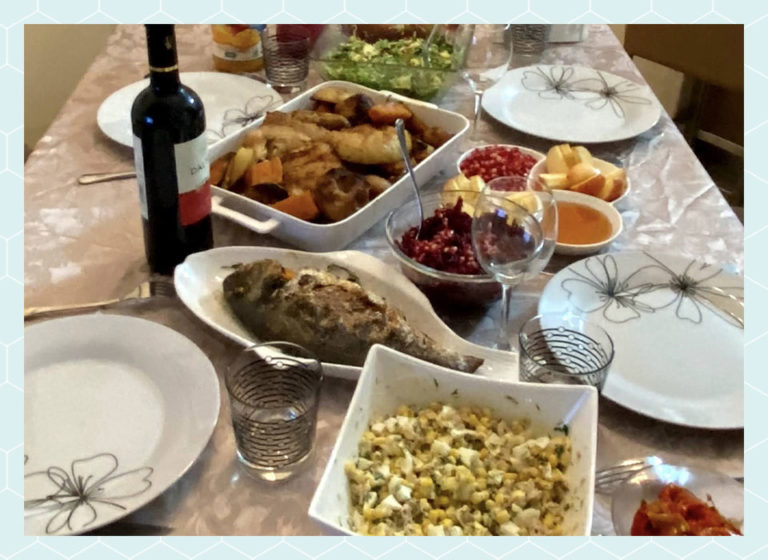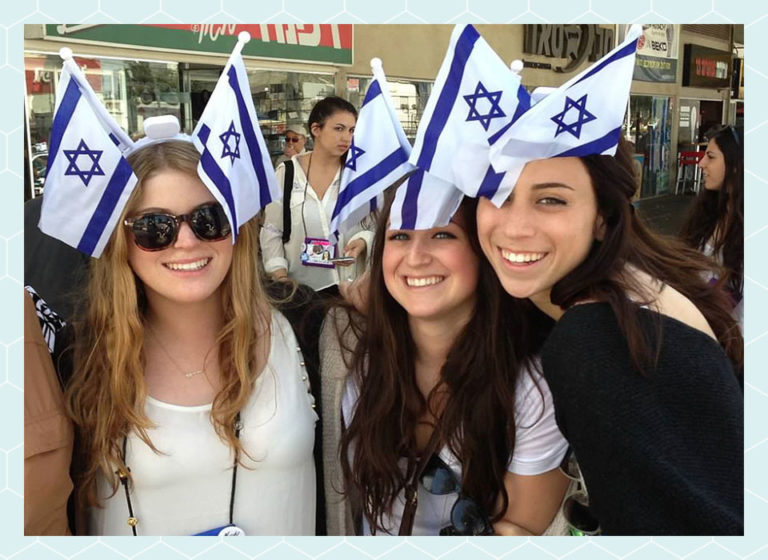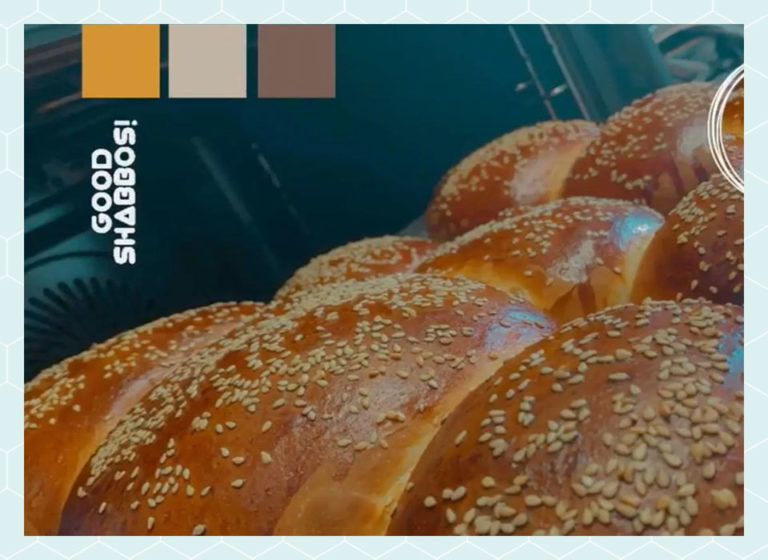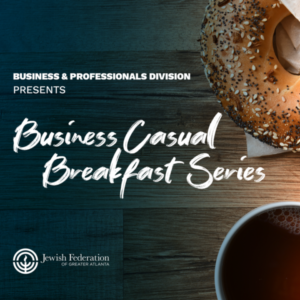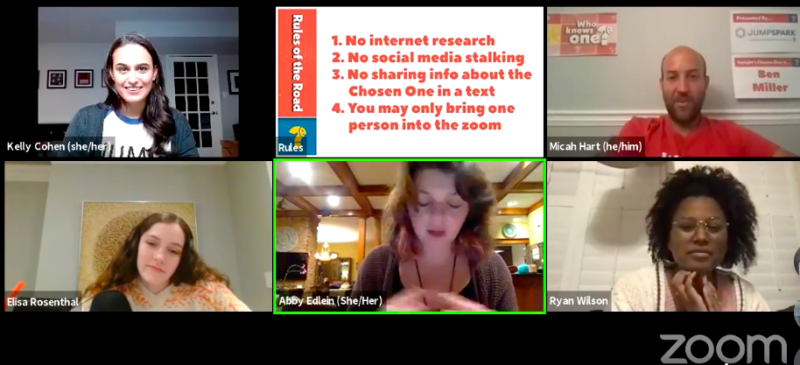
‘Who Knows One?’ sees its post-pandemic life in fundraising — and maybe matchmaking

The pandemic’s restrictions on social life have inspired new ways of connecting, from virtual birthday parties to Zoom speed-dating to digital simchas. In the Jewish community, they’ve given rise to a gamified version of “Jewish geography,” a favorite pastime of youth group alums, campers and others who have been active in Jewish social circles. Created by Micah Hart, “Who Knows One?” is named for the Passover Seder song of the same name, and was inspired by an ESPN show Hart watched in which the hosts competed to see who could get the most famous person to join a Zoom call. “It just sort of dawned on me. We were all at home, we had nothing else to do,” he told eJewishPhilanthropy.
A resident of Atlanta, Hart is the son of Macy Hart, a longtime director of the Henry S. Jacobs Camp, a Union for Reform Judaism camp in Utica, Miss., and the founder of the Goldring/Woldenberg Institute for Southern Jewish Life. He had lost his job as head of social media for the restaurant franchise Buffalo Wild Wings early in the pandemic, and as a lifelong fan of Jewish geography, in which at least two people identify who they know in common, he realized that it could be enjoyable as a filmed contest. He also felt he had the skills to try to make it happen due to his professional background as a creator of digital content. Now, “Who Knows One?” is Hart’s full time job.
The show, which runs on Wednesday and Saturday nights on Facebook Live, premiered last April 25; it has taken several forms in 150 showings since then, including a March Madness-type tournament called “Elijah’s Cup” that ran through Passover, but the basic premise remains the same: The hosts announce the name of a Jewish person unknown to the competitors, and the contestants or (or in some cases, teams of contestants) work to locate that person and bring him or her onto the Zoom call by building a chain of connections using only clues from the hosts — no help from the internet allowed. When the game ends quickly, Hart and his co-hosts bring in a second individual. “There’s a lot of improv in the show,” Hart said. “We know where we’re starting and ending but nothing about the middle, and the more off the rails it goes, the more entertaining it is.” Hart can’t estimate the total number of people who have been exposed to the show because audience numbers vary widely, but a regular Wednesday or Saturday night show can attract up to 4,000 viewers, split about equally between those who watch live and those who tune in later.
The regular shows occasionally generate revenue in the form of sponsorships, but the bulk of the business is what Hart calls “community games.” Those can take the form of a “fun-raiser,” in which a group pays him to host a show as a fun way for them to spend time together online, or a “fundraiser.” Organizations from the World Union for of Progressive Judaism to a slew of summer camps to the Melton School of Adult Jewish Learning have all raised money on “Who Knows One?” and Hart, for his part, charges a flat fee, although upgrade packages are also available. One Jewish group — JumpSpark, a source of Jewish programming for teens in Atlanta — used the show as both a fundraiser and an educational experience. Four teens competed on a JumpSpark-sponsored show, which raised more than $3,000, said a spokeswoman. The students each chose an individual cause to support, and friends and family contributed to a pool of funds. All four causes — Project Merry Mitzvah, Camp Jenny, the Anti-Defamation League and Repair the World — received donations from that pool, although Repair the World received the most, as its sponsor won the game. “I appreciated the platform it provided me to reconnect with other teens and family friends I hadn’t spoken to in a while,” said Abby Limor of Temple Beth Tikvah, one of the participants.
As Hart has gained experience in hosting the fundraisers, he’s devised additional ways to raise money; the audience can “buy” extra clues for the contestant they support, for example. He has a brain trust with whom he bounces ideas around, and audience suggestions have also helped shape the show — the name of the show was a viewer’s idea, he said. But he’s also worked for the Atlanta Hawks and the NBA, and his professional background helps, too, as he turns the project into more of a business. “Most of my life was about figuring out how to make money from digital content in a way that’s not intrusive for an audience,” he said.
Hart aims for an unpretentious vibe he calls “soul-nourishing” — the whole enterprise leans heavily into the come-as-you-are aesthetic of pandemic-era Zoom. Recommended attire is loungewear, although some contestants sport “Who Knows One?”-branded swag in the form of red headbands. The show also tries to be inclusive and to avoid assuming that every American Jew is Ashkenazi and fair-skinned, Hart said. He replaced a tie-breaker round that depended on finding someone with a “typically” Jewish name, for example, with one that focuses on occupations and home addresses.
As people get vaccinated and are able to safely gather again in person, demand for “Who Knows One?” could drop, Hart said. In that case, he will consider cutting the Saturday night show. However, he believes that the communal need for connection satisfied by the show predated coronavirus, although the pandemic exacerbated it. “We’re all isolated from each other, and that’s true in the pandemic era, but it already existed,” he said. “We accumulate people throughout our lives that we care about — from camp, school, college, previous jobs — as we get older, the ability to spend time with those people just melts.”
He’s considering several possible mechanisms to grow the show, including more community games. He’s toying with the idea of taking the show live, in the style of NPR’s “Wait, Wait, Don’t Tell Me,” and has developed some customers outside the Jewish community, such as the American College of Emergency Physicians. “Desi Chain,” which plays on a Hindi term for people of Indian origin or descent, is a “sister show” to “Who Knows One?” Another possibility: a dating show, which Hart says someone asks him to do at least once a week. “I know the interest is there,” he said. “I have not figured out how to do that. People are still pretty isolated. But I think it’s possible, coming out of the pandemic, that some sparks could potentially fly.”
This article was originally published in eJewishPhilanthropy.
